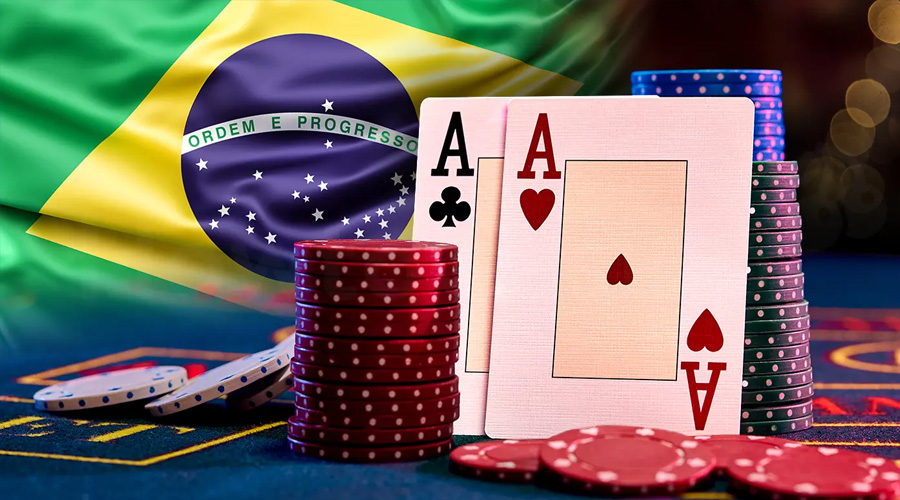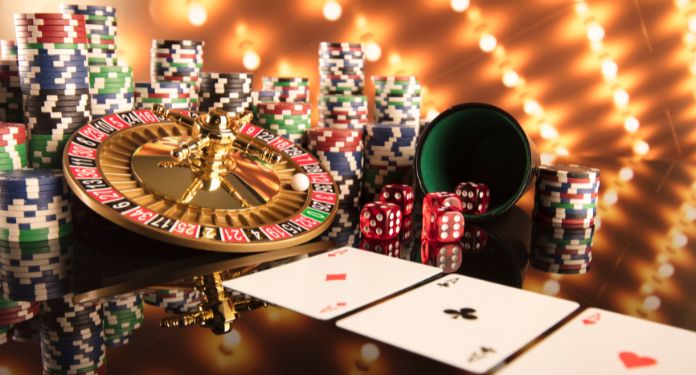Gambling in Brazil is prohibited as of 2017. The government is discussing a package of laws on gambling legislation.
Already, the gambling market in Brazil is one of the largest in Latin America. The Brazilian Legal Gaming Institute (Instituto Brasileiro Jogo Legal, IJL) is a non-profit government organization that researches gambling in the country. According to the statistics presented by her, the gambling market here reaches 6.4 billion USD annually. All these cash flows are illegal.
Land-based and online casinos are prohibited in Brazil. Approximately 200,000 players travel regularly to neighboring Uruguay. Thus, every year Brazil loses about 2 billion USD of possible taxes that could go directly to the state budget.

Gambling legislation
As of 2017, gambling in Brazil is covered only by the Law of Misdemeanours, Decree Law No. 3688/1941. Gambling is completely prohibited. Participation and organization of gambling is punishable by a prison term of 3 months to one year. Players are also heavily fined. Land-based casinos will have all property confiscated.
The named law was issued in 1941, and has not changed since then. In Brazil, they do not distinguish between land-based and online casinos – both types are illegal. The law prohibits any provision of access to gambling (including online).
However, in the last decade, the approach to the gambling business has softened somewhat. For example, in Brazil they began to treat poker more condescendingly.
Since 2014, Senate Bill No. 186/2014 has been actively discussed in the government. Thanks to him, private operators of bingo, sports betting and casino games should be legalized.
The second bill is House Bill No. 442/1991. It has similar goals. One of these laws must be approved. The bill is expected to come into force around the end of 2017.
Gambling regulators
Depending on which act is passed, the regulator will be a state bank (Caixa Econômica Federal, CEF) or a new regulatory body. At the moment, the bank deals with lottery issues and issues permits for lottery operators.
Both bills establish that the government will give concessions to those who wish to gamble. In addition to this:
- by Senate Bill No. 186/2014 the Minister of Finance will determine the financial agencies for licensing and site inspections;
- by House Bill No. 442/1991, the state will issue licenses for public lotteries and animal game (Jogo do Bicho) type lotteries. Municipalities will license and inspect bingo on their territory.
- Jogo do Bicho is a lottery where bets are placed on animals that represent numbers. For example, one is an oyster, two is an eagle, and the number 25 is a cow. The only province where this game is now allowed is Paraiba.
The regulator of the game in Paraiba is the Lottery of Paraíba (LOTEP), which issues licenses to lottery agents. The provincial capital, for example, has 15 licensed gambling establishments. All of them pay a monthly tax, the amount of which varies depending on the size of the city. The province’s central city, João Pessoa, charges 6,000 R$ (a little over 1,900 USD) from each establishment.
Conditions for obtaining a license
According to Senate Bill No. 186/2014 licenses will be issued based on the results of a tender. House Bill No. 442/1991 establishes that the state, after such a tender, will issue concessions for casinos and national lotteries.
Both bills require the operator to have a ground office in Brazil. The company must provide evidence of its solvency: technical expertise of its equipment, confirm creditworthiness and the fact that all taxes have been paid.
Legal games in Brazil
Some games in Brazil have an indeterminate status because they are not defined solely as games of chance. For example, Texas hold ’em is considered a game that requires skill rather than luck.
Bingo was previously regulated by the law of 1993 (Law No. 8,672/1993). Sports organizations could run bingo as an additional source of income. The inspection was carried out by the National Institute for Sports Development. After 2004, bingo was also banned.
The lottery is strictly in the state monopoly. Caixa Econômica Federal issues lottery licenses to private operators.
Both bills legalize:
- poker;
- betting and sports betting;
- casino;
- slot machines (80% of bets will have to be paid out in the form of winnings);
- bingo and lotteries.
Senate Bill No. 186/2014 will allow the operation of casino hotels. Forty percent of all establishments will be located in the north and west of the country. The term of the license is 25 years with a possible extension. Online casinos will be controlled exclusively by the state bank Caixa Econômica Federal.
House Bill No. 442/1991 will allow casino hotels, but in a slightly different way. Each province will have up to three casinos, the number depends on how many people live in the territory. One operator will be able to obtain only one license in the province and no more than five throughout the country. The term of the permit is 30 years with the possibility of renewal. Only operators with land-based casinos will be able to run online casinos.
Online gambling
Online casinos in Brazil are illegal. Nevertheless, Internet users find access to the best foreign sites. Most popular resources:
- Royal Vegas – provides mainly software from Microgaming. Bonus – 1 200 USD;
- JackpotCity Casino is a large piece of software from Microgaming. Bonus – 1 600 USD;
- 888 Casino – games from different manufacturers. Bonus – 1 500 USD;
- Royal Panda – a diverse range of games. Bonus – 100 USD;
- Euro Palace is basically software from Microgaming. Bonus – 500 USD.
International operators provide an interface in many languages for the convenience of their customers.
Popular slot machines in the country
Here is a list of the most popular slot machines in Brazil:
- Top cat;
- Twin Spin;
- motorhead;
- Count Duckula;
- winstar.
Top Cat is a five-reel slot machine from Blueprint Gaming. The machine has a chance to play a progressive jackpot bonus game, use wild reels, respins and five interactive bonus rounds.
Twin Spin is a five-reel slot from NetEnt with 243 ways to make winning combinations. Several drums may be the same.
Motörhead is a slot machine from NetEnt with 76 pay lines and 5 reels with different number of cells. Some symbols can turn into others, forming combinations. On the slot, it is possible to get symbols that appear in stacks and free spins.
Count Duckula is a 5 reel, 20 payline slot from Blueprint Gaming. Forty lines are available in the bonus game. It is possible to hit the jackpot and activate 4 random bonuses, as well as open 5 bonus rounds.
Winstar is a 5 reel slot machine from NetEnt with 10 paylines. There is a chance to get a jackpot in the amount of the linear bet multiplied by x5000 times. Some symbols can turn into other pictures, completing combinations.
prospects
While the government continues to argue about what law to pass, foreign large firms are already applying for permission to build land-based casinos. In April 2017, the president of the economic development department of the province of Minas Gerais said in an interview that three large companies have already expressed a desire to build a hotel-casino with them. It is known that two firms are from Spain, and the third one is from the USA.
In May of the same year, the famous casino magnate Sheldon Adelson met with the mayor of Rio de Janeiro. The subject of the meeting was the idea to build a complex worth 8 billion USD. Apparently, a new casino will be part of the tourist complex.
As for online gambling, the authorities are also introducing various innovations here. In July 2017, a senator proposed to ban Brazilians from using credit and debit cards to pay at online casinos. In this way, the authorities hope to reduce the risk that players spend too much on gambling. It is known that even now Brazilians spend annually 951 million USD on foreign websites.
Outcome
The introduction of new gambling legislation will allow Brazil to open up a large gambling market. The largest country in Latin America has the potential to become one of the most powerful and fastest growing markets. Revenues to the Brazilian budget from the gambling business can become a serious source of income.

